Women's suffrage is the right of women to vote in elections. At the beginning of the 18th century, some people sought to change voting laws to allow women to vote. Liberal political parties would go on to grant women the right to vote, increasing the number of those parties' potential constituencies. National and international organizations formed to coordinate efforts towards women voting, especially the International Woman Suffrage Alliance.

Sukarno was an Indonesian statesman, orator, revolutionary, and nationalist who was the first president of Indonesia, serving from 1945 to 1967.

Nahdlatul Ulama is an Islamic organization in Indonesia. Its membership numbered over 95 million in 2021, making it the largest Islamic organization in the world. NU is also a charitable body funding schools and hospitals as well as organizing communities to help alleviate poverty.
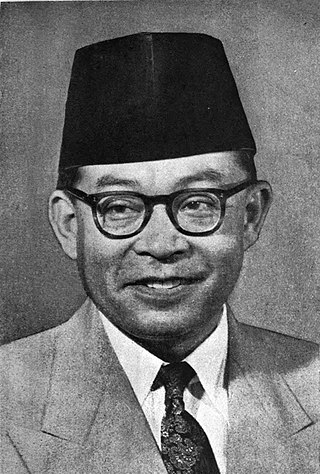
Mohammad Hatta was an Indonesian statesman, nationalist, and independence activist who served as the country's first vice president as well as the third prime minister. Known as "The Proclamator", he and a number of Indonesians, including the first president of Indonesia, Sukarno, fought for the independence of Indonesia from the Netherlands. Hatta was an important figure during the Indonesian national awakening and during the national revolution, as a youth he was politically active both in the Netherlands and the Indies, which led him to be imprisoned in the Boven Digoel concentration camp for his activism, he also played a crucial part in the proclamation of Indonesian independence, being second the person to sign the declaration besides Sukarno, thus naming him as one of the founders of Indonesia.
The Taiwanese Communist Party was a revolutionary organization active in Japanese-ruled Taiwan. Like the contemporary Taiwanese People's Party, its existence was short, only three years, but its politics and activities were influential in shaping Taiwan's anti-colonial enterprise.

Pramoedya Ananta Toer, also nicknamed Pram, was an Indonesian novelist and writer. His works span the colonial period under Dutch rule, Indonesia's struggle for independence, its occupation by Japan during the Second World War, as well as the post-colonial authoritarian regimes of Sukarno and Suharto, and are infused with personal and national history.

Islam is the largest religion in Indonesia, with 87.06% of the Indonesian population identifying themselves as Muslims, based on civil registry data in 2023. In terms of denomination, the overwhelming majority are Sunni Muslims; the Pew Research Center estimates them as comprising ~99% of the country's Muslim population in 2011, with the remaining 1% being Shia who are concentrated around Jakarta and about 400,000 Ahmadi as well.

The Korean independence movement was a series of diplomatic and militant efforts to liberate Korea from Japanese rule. The movement began around the late 19th or early 20th century, and ended with the surrender of Japan in 1945. As independence activism on the peninsula was largely suppressed by Japan, many significant efforts were conducted abroad by the Korean diaspora, as well as by a number of sympathetic non-Koreans.
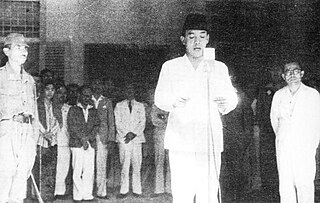
The Proclamation of Indonesian Independence was read at 10:00 Tokyo Standard Time on Friday, 17 August 1945 in Jakarta. The declaration marked the start of the diplomatic and armed resistance of the Indonesian National Revolution, fighting against the forces of the Netherlands and pro-Dutch civilians, until the latter officially acknowledged Indonesia's independence in 1949. The document was signed by Sukarno and Mohammad Hatta, who were appointed president and vice-president respectively the following day.
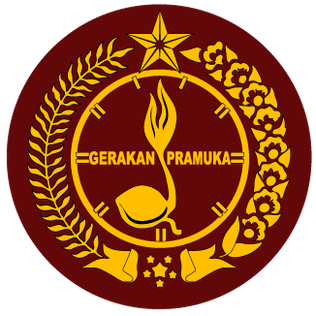
The Pramuka Movement of Indonesia, officially the Praja Muda Karana Scouting Movement, is the national scouting organization of Indonesia. Scouting was founded in the Dutch East Indies in 1912, and Indonesia became a member of the World Organization of the Scout Movement (WOSM) in 1953. Regulated by the Pramuka Movement Act of 2010, all elementary and secondary schools must operate a scouting program; and membership was compulsory for students in elementary and secondary schools from 2013 to 2024. It has 25.272.760 members, making it the world's largest Scout association.
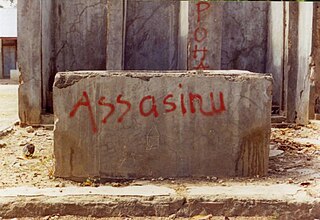
Pro-Indonesia militias in East Timor, commonly known as Wanras, were active in the final years of the Indonesian occupation leading up to the 1999 independence referendum. They were groups of armed civilians trained by the Indonesian National Armed Forces (TNI) to maintain peace and order in their region on official orders. The Indonesian Constitution of 1945 and the Defence Law of 1988 stipulate that civilians have the right and duty to defend the state by receiving basic military training.

Hajjah Rangkayo Rasuna Said was a campaigner for Indonesian independence and women's rights, particularly their rights to education and participation in politics. Being politically active herself prior and after Indonesia's independence, Rasuna Said became a member of various political organizations and later served as a member of the Provisional People's Representative Council and the Supreme Advisory Council under Sukarno's tenure. Due to her involvement in Indonesia's struggle for independence, she was recognized posthumously as an Indonesian national heroine.

Greater Indonesia was an irredentist political concept that sought to bring the so-called Malay race together, by uniting the territories of the Dutch East Indies with British Malaya and British Borneo. It was espoused by students and graduates of Sultan Idris Training College for Malay Teachers in the late 1920s, and individuals from Sumatra and Java, including Mohammad Natsir and Sukarno, on 28 September 1950. Indonesia Raya was adopted as the name of what later became the Indonesian national anthem in 1924.

The Indonesian Political Federation was an umbrella organization of various nationalist organizations in the Dutch East Indies which existed from 1939 to 1942. Founded to unite the nationalist movement, GAPI championed the creation of an Indonesian parliament in exchange for cooperation with the Dutch colonial government. The federation consisted of eight political parties. GAPI was dissolved shortly after the invasion of the colony by the Empire of Japan in 1942.
Singanhoe (Korean: 신간회) or the New Trunk Association was a Korean independence activist group founded on February 15, 1927 during the Japanese colonial period. It unified Korean socialist and nationalist factions and maintained a unilateral independence movement until May 1931. Including both Korean and overseas branches, this organization was able to attract a total membership of between 30,000 and 40,000 people. While internal strife between leftist and rightist factions was a consistent obstacle, the Singanhoe actively pursued several goals:
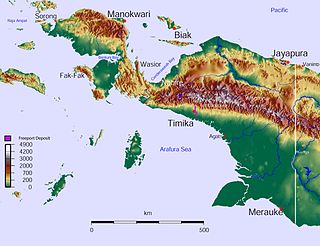
The West New Guinea dispute (1950–1962), also known as the West Irian dispute, was a diplomatic and political conflict between the Netherlands and Indonesia over the territory of Dutch New Guinea. While the Netherlands had ceded sovereignty over most of the Dutch East Indies to Indonesia on 27 December 1949 following an independence struggle, it retained control over its colony on the western half of New Guinea. The Indonesian government claimed this territory as well, on the basis that it had belonged to the Dutch East Indies and that the new Republic of Indonesia was the legitimate successor to the former Dutch colony.
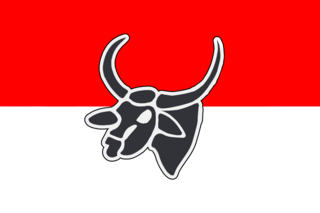
Perhimpoenan Indonesia or PI was an Indonesian student association in the Netherlands in the first half of the twentieth century. It was established under the Dutch name Indische Vereeniging. It later changed its name to Indonesische Vereeniging in 1922, and its Malay translation Perhimpoenan Indonesia in 1925. Although small in membership numbers – throughout the period between 30 and 150 members – the organization was important because it was one of the first to campaign for full Indonesian independence from the Netherlands, and because many PI-students would later acquire prominent political positions in the independent state of Indonesia.

Johannes Latuharhary was an Indonesian politician and nationalist of Moluccan descent, who served as the first Indonesian governor of Maluku from 1945 until 1955, though he did not assume office in Maluku until 1950. A Protestant Christian, Latuharhary was an early proponent of Moluccan inclusion in the Indonesian state and he was an active participant in the struggle for Indonesia's independence.

Feminism in Indonesia refers to the long history of discourse for gender equality to bring about positive social change in Indonesia. The issues women in Indonesia currently are facing include gender violence, underage marriages, and lack of representation in the political system. Feminism and the women's right movement began during colonial Indonesia under Dutch rule and were spearheaded by the national heroine Kartini, a Javanese noblewoman who advocated for the education of all women and girls regardless of social status. In the early 19th century, women's rights organizations and movements were allowed to developed under Budi Utomo, the first Indonesian Nationalist organization. Modern day Indonesian feminism include and are influenced by both fundamentalist and progressive Islamic women's organizations.

The Indonesian Women's Congress, often known by its Indonesian acronym Kowani, is a federation of Indonesian women's organizations which was founded in 1946. Its headquarters are located in Jakarta. The name also refers to national congresses which have taken place regularly since 1928. Since its founding the Congress has included women from various political and religious backgrounds; it has generally allowed independence and autonomy for its member organizations.
















